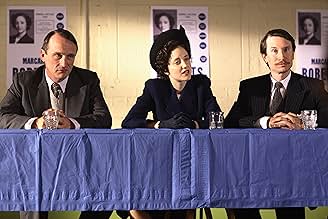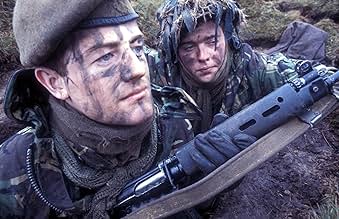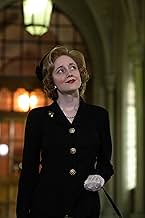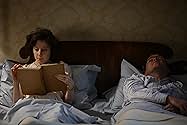अपनी भाषा में प्लॉट जोड़ेंOn April 2, 1982, Britain went to war to regain the Falkland Islands. This movie is a gripping account of how Prime Minister Rt Hon Margaret Thatcher MP's government handled the biggest cris... सभी पढ़ेंOn April 2, 1982, Britain went to war to regain the Falkland Islands. This movie is a gripping account of how Prime Minister Rt Hon Margaret Thatcher MP's government handled the biggest crisis in British foreign affairs since the Suez Canal. It tells the story of how Argentina, a... सभी पढ़ेंOn April 2, 1982, Britain went to war to regain the Falkland Islands. This movie is a gripping account of how Prime Minister Rt Hon Margaret Thatcher MP's government handled the biggest crisis in British foreign affairs since the Suez Canal. It tells the story of how Argentina, an ally of the British, fought the Conservative government and invaded the Falklands. This ... सभी पढ़ें
फ़ीचर्ड समीक्षाएं
As noted by a reviewer above, Thatcher's political position was very weak at the time. She was seen by the country and many of her "wet" cabinet ministers as being a right wing liability who would sink the Tories at the next election because she had worsened, not improved, Britain's economy. Unemployment had sky-rocketed.
The decision to withdraw HMS Endeavour from the South Atlantic (the supply ship for the Falklands) was made by her right wing Defence Minister John Nott on grounds of cost- cutting. Both the Foreign Office under Carrington and I believe the Chiefs of Staff and the Intelligence Services opposed it on the grounds that the Argentinians would interpret the withdrawal as a sign that the UK was not serious about maintaining its Falklands colony and this would greatly encourage them to invade. Thatcher overruled them and backed Nott. She therefore had direct responsibility for this mistaken decision and should, on the Argentinian invasion, have resigned.
This was known at the time of the Saturday House of Commons debate by many people, especially on the Conservative back benches. There was great unease on them, and talk of replacing her. What saved her probably was Michael Foot's highly patriotic support of her in his speech and the fact that the debate only lasted 4 hours rather than the more usual 8. (Clever work probably by the Whips). If it had been 8, it is very likely that this unease about Thatcher would have surfaced from both wets and right wingers who suspected she was an incompetent woman who had blundered into a war.
Then, had she been replaced - probably by a wet ("wets" by and large were of an older generation than the supporters of Thatcher and had fought in the 2nd War and would have been thought "reliable" to fight another war) - the war would have gone ahead, Britain would again probably have won, and a "wet" rather than Thatcher would have been in charge of Britain and subsequent history would have been radically different. But it is through ironies like this that history operates. As it was, it was those who had been originally been right on "Endeavour" who were forced to resign like Carrington, and Thatcher, the British politician (along with Nott) most responsible for allowing the war to break out, the person who went on to be lionised as a great Churchillian war leader.
The Saturday Commons debate was the great turning point. Curteis presents the debate falsely as a straight patriotic piece of Churchillian stiff upper-lip tub thumping. (This is understandable, the Left had been and was caricaturing Thatcher mercilessly in their propaganda and Curteis's play is his right-wing propaganda blast back). But it would have been far more interesting - and dramatic - to go for neither villains or heroes, but what history really consists of - human beings. And by showing complexities and ironies, rather than pieties and propaganda.
Patricia Hodge was wonderful as "Maggie" and being a big fan of British TV and films many other faces were quite familiar. I was quite struck by how Rt Hon Francis Pym and members of the labor party has so quickly forgotten the lessons and cost of appeasement! At one point I would've loved to hear Mrs. Thatcher respond to those questioning the rightness of fighting over "some small rocks and a handful of people" with "If 1,800 British subjects are not worth fighting for, please tell me, exactly, what is the minimum number that IS? 5,000? 10,000? 100,000? 1,000,000?"
Besides having been there to listen to the daily coverage, I've watch a number of documentaries and read a number of books on the battle including the memoirs of the Battle Group Commander Adm. Sandy Woodward. Everything in this movie tracks closely with everything else that I know about the time, the situation and the battles. The one thing I would take exception with, frankly comes as no surprise to me. The all too familiar anti-American jealousy/prejudice that is very common in British programming. One need only contrast the carefully chosen flattering selection of Patricia Hodge to play Margaret Thatcher with the perhaps equally carefully chosen unflattering selection of Bob Sherman to play President Reagan. Not only did he bear no resemblance beyond an American accent, he played Reagan as a bumbling fool who couldn't even remember the name of the islands rather than the strong leader who helped bring down the Berlin wall and with it the Soviet Union. The most pathetic moment was portraying Reagan as having trouble deciding which tie to wear while discussing the issues. That was simply petty and mean.
Lost in all of this is the reality that the British government had allowed this crisis to develop through apathy, neglect and an unwillingness to sacrifice. The Argentine government was emboldened to act due to the steady decline of the power of the Royal Navy and in fact, had they the patience to simply wait a year or two more, the RN's only two carriers would've been decommissioned and Britain would've been forced to accept the take over of the islands. As it is, the losses of British shipping, especially that of the Sheffield and Coventry were reportedly contributed to a decision to cut costs on construction by reducing the length of the ships eliminating the space required for the anti-missile system they were originally designed to carry. This would seem to be a major deficiency for a ship supposedly designed for radar picket duty to detect and defend incoming missile attack! Oddly enough, another documentary I recently watched about the Eurofighter project disclosed similarly dangerous cost cutting which only proves that even those lessons written in blood are too soon forgotten!
The acting is of the highest order...... you truly believe that these are the people, and this is how they behaved (Hodges Thatcher is remarkable). Add this to a plot that fiction could never match, and you are likely to be hooked from the opening scene.
With caution, I would also suggest that this drama does bring history to the viewer, in a way the BBC seems to constantly excel at. Much of the script is taken from hansard (parliamentary transcripts), contemporary diaries, and news reports..... the drama didn't need to be invented.
One or two earlier reviewers felt that it was a historical distortion, however, in my opinion, they are still grinding axes.
So yes.... do bear in mind that in the years running up to the crisis, perhaps the Brits took their eye off the Falklands (though this is outside the remit of this play).
Also yes.... there was the major incident 'sinking of the Belgrano', that in real life, was controversial. However, I believe the play portrayed the genuine view of the decision makers: 'destroy it, before it destroys us'.... a view held by the majority of the UK population (I would suggest).
As for the suggestion that 'Thatcher would never have ranted against Argentina to the US', I find beyond belief. That's exactly how she behaved, and she was famous for it AND by the way, it is portrayed marvelously in this play, with the joy of historical posturing so well done.
If you get the chance...... watch it!
The actor selection is excellent and the writer has put together an excellent script which lends clarity to some of the decisions made at the time.
The direction is crisp and the interweaving of News clips highlights the historical events.
Particularly emphasised are the outstanding efforts made by the American administration led by Ronald Regan and efforted by Secretary Haig to stop the downhill slide into war.
A truly tragic and unnecessary war - but an excellent play.
Can't wait for the DVD to be issued.
क्या आपको पता है
- ट्रिवियाOriginally commissioned by the BBC in 1987, but wasn't filmed until 2002.
- गूफ़Admiral Lewin is wearing the South Atlantic Medal. Before the war had even begun.
- भाव
[in a War Cabinet meeting]
Margaret Thatcher: Do we send those ships? Do we still have the will to fight aggression by force of arms, even halfway across the world, even at huge risk of world opinion turning against us? Because if we don't have it any more, for God's sake say so now and pull out before we start. It may be we *are* going to war. People *will* get killed. Innocent people. Young soldiers, many of whom won't even know what it is we are fighting for. Are we really prepared to do that? Do we still believe what we certainly believed in in 1940? Or is that now just the romance of history, nothing to do with the cold reality of Britain in 1982, part of a nation that has, actually, quietly died, as Greece died, as Spain died? Because if in our hearts we really believe that Britain is dead, then it would be a crime of the direst and blackest sort to send those men to fight, a crime of which the country would very soon find us guilty, because their hearts won't be in it. The first death will light the fuse that will blow us sky-high and clean out of office at the next election. Now, do we send the signal or not?
[each cabinet minister, with some hesitation, says "yes"]
- क्रेज़ी क्रेडिटThe first names of Nicholas Ridley and Jeanne Kirkpatrick were mis-spelled as Nicolas and Jeane in the closing credits.
- कनेक्शनFeatured in When TV Goes to War (2011)

































